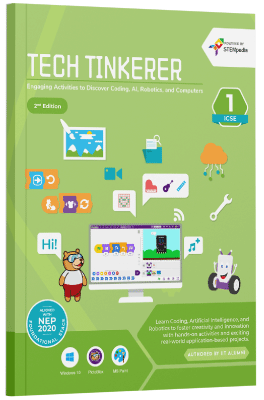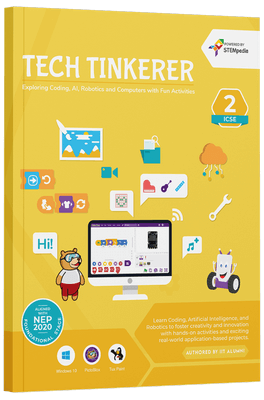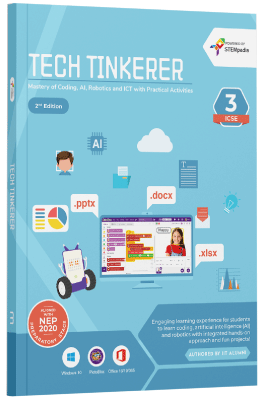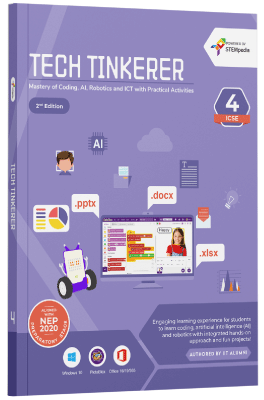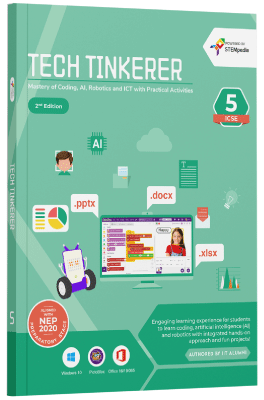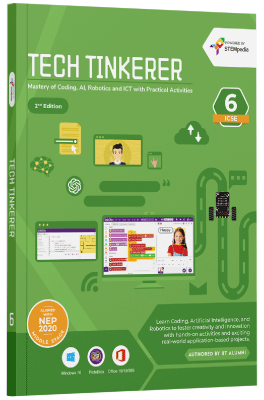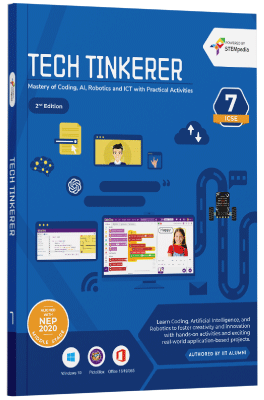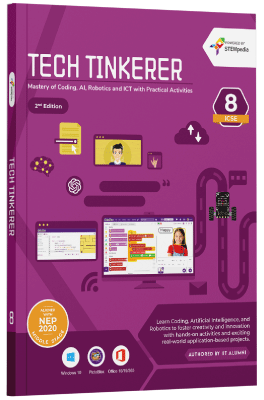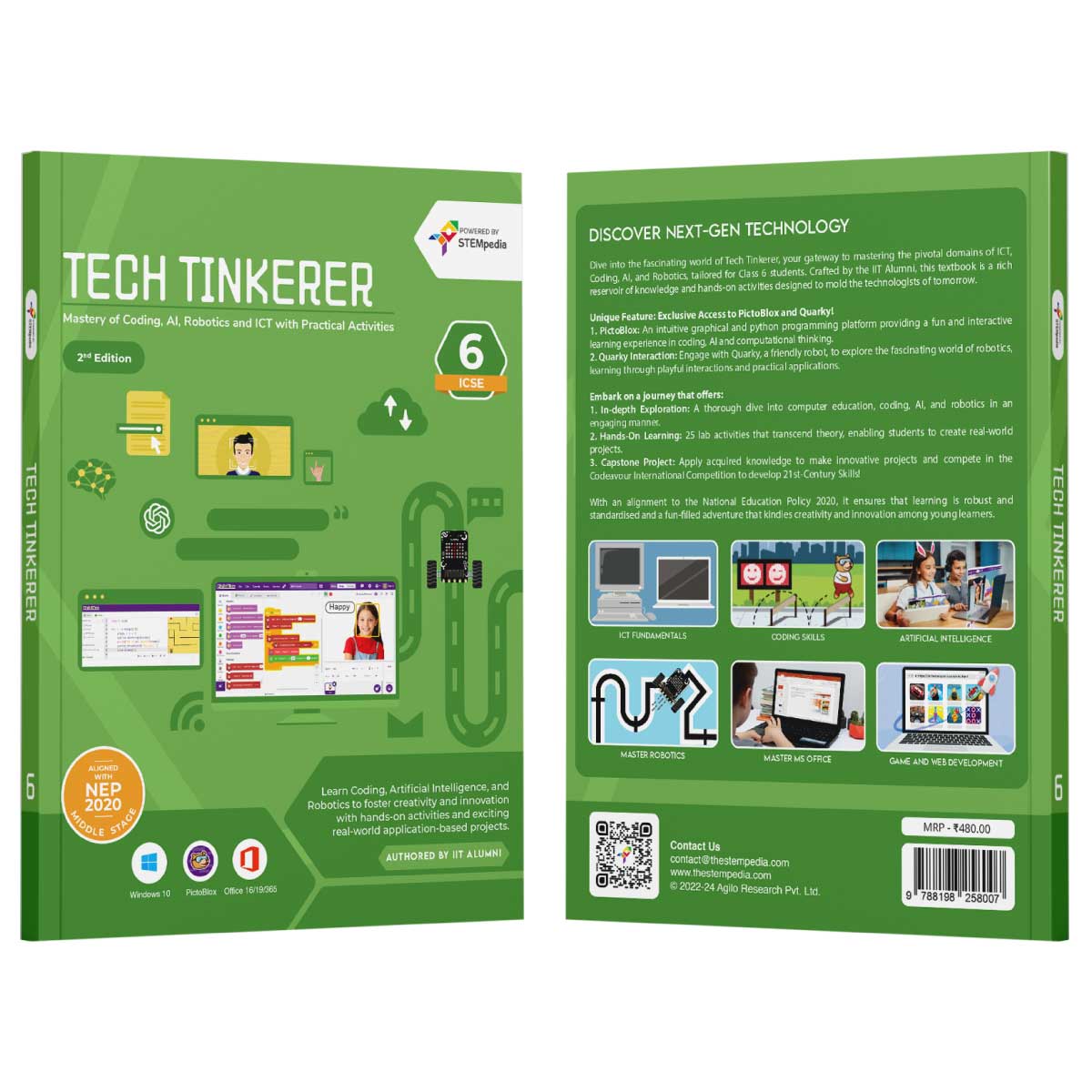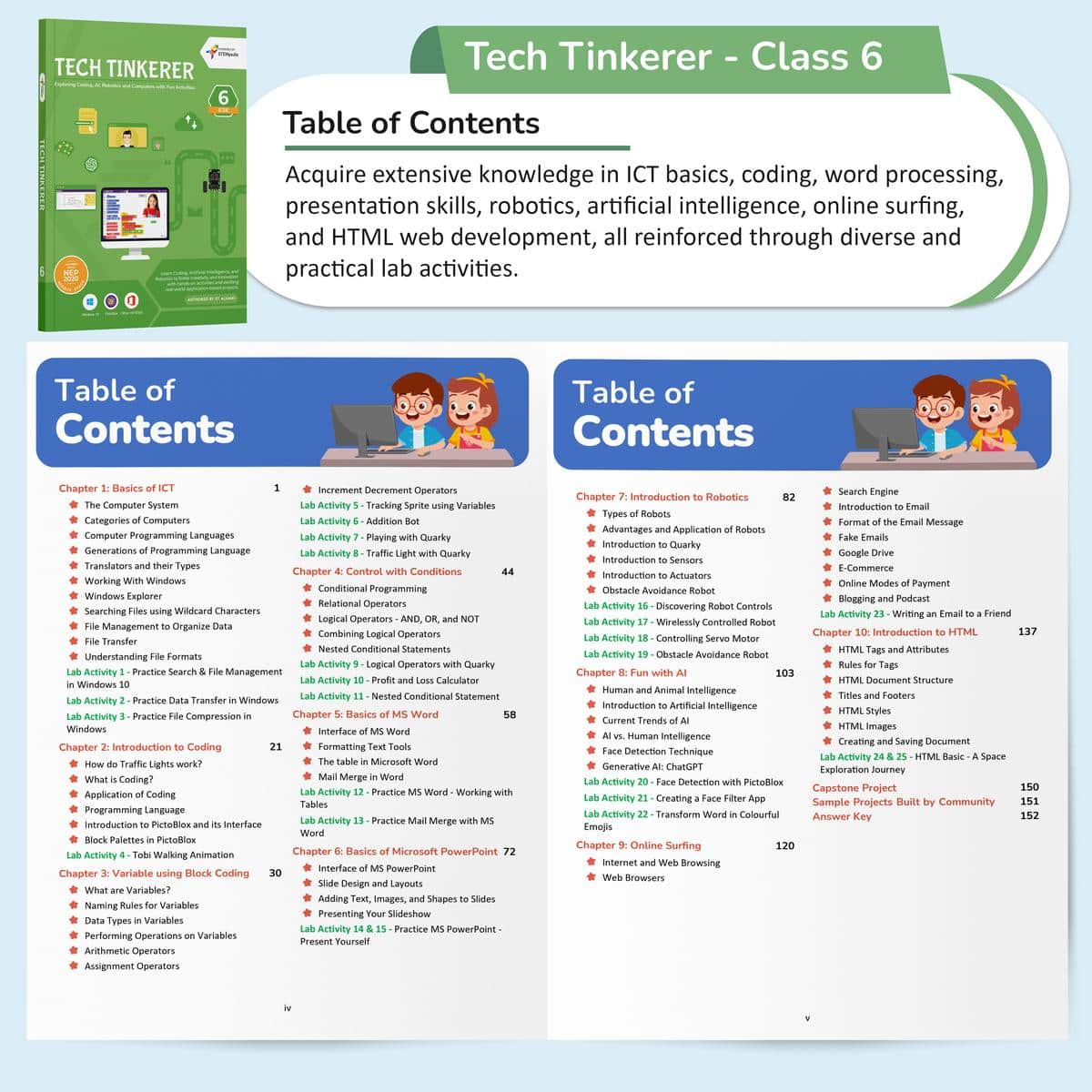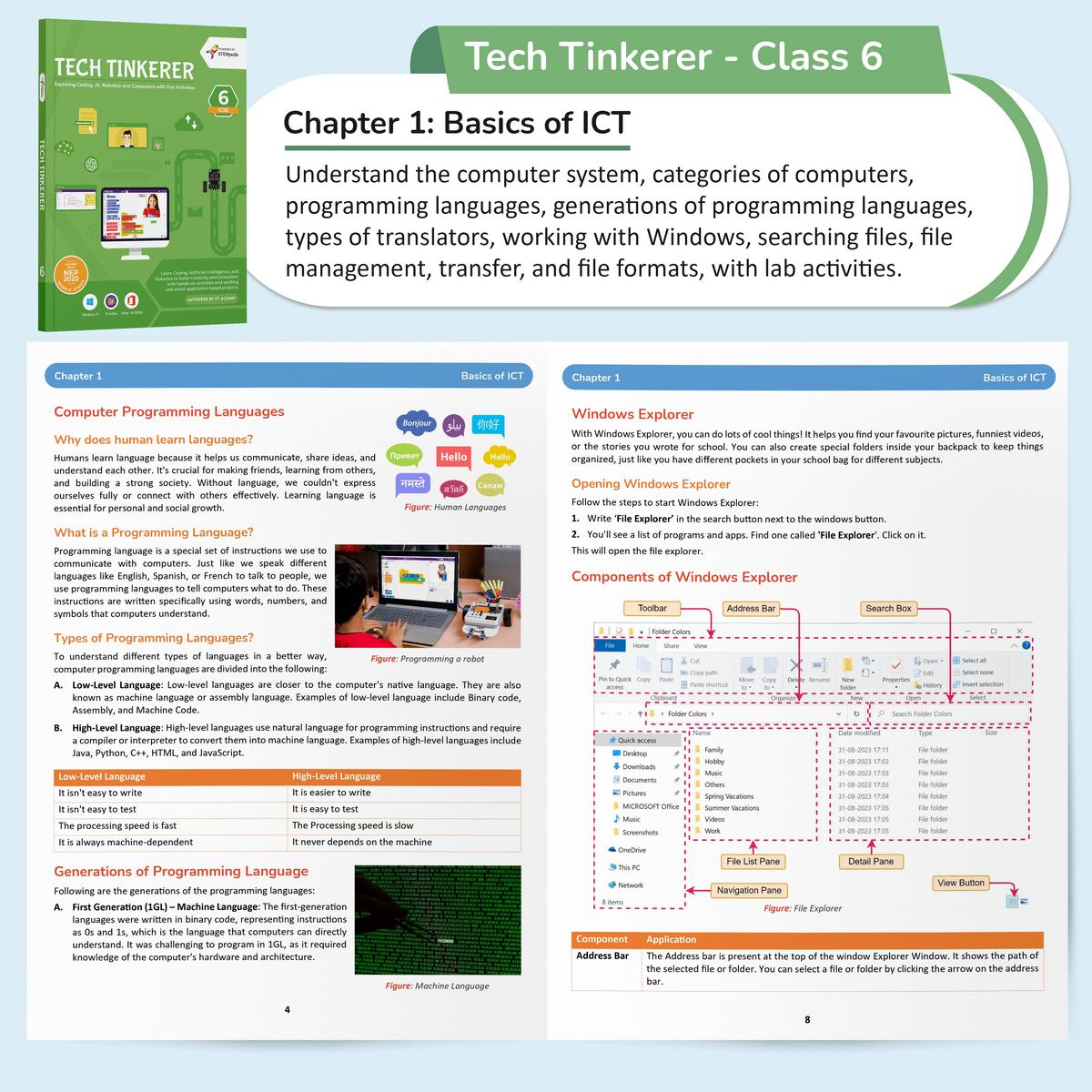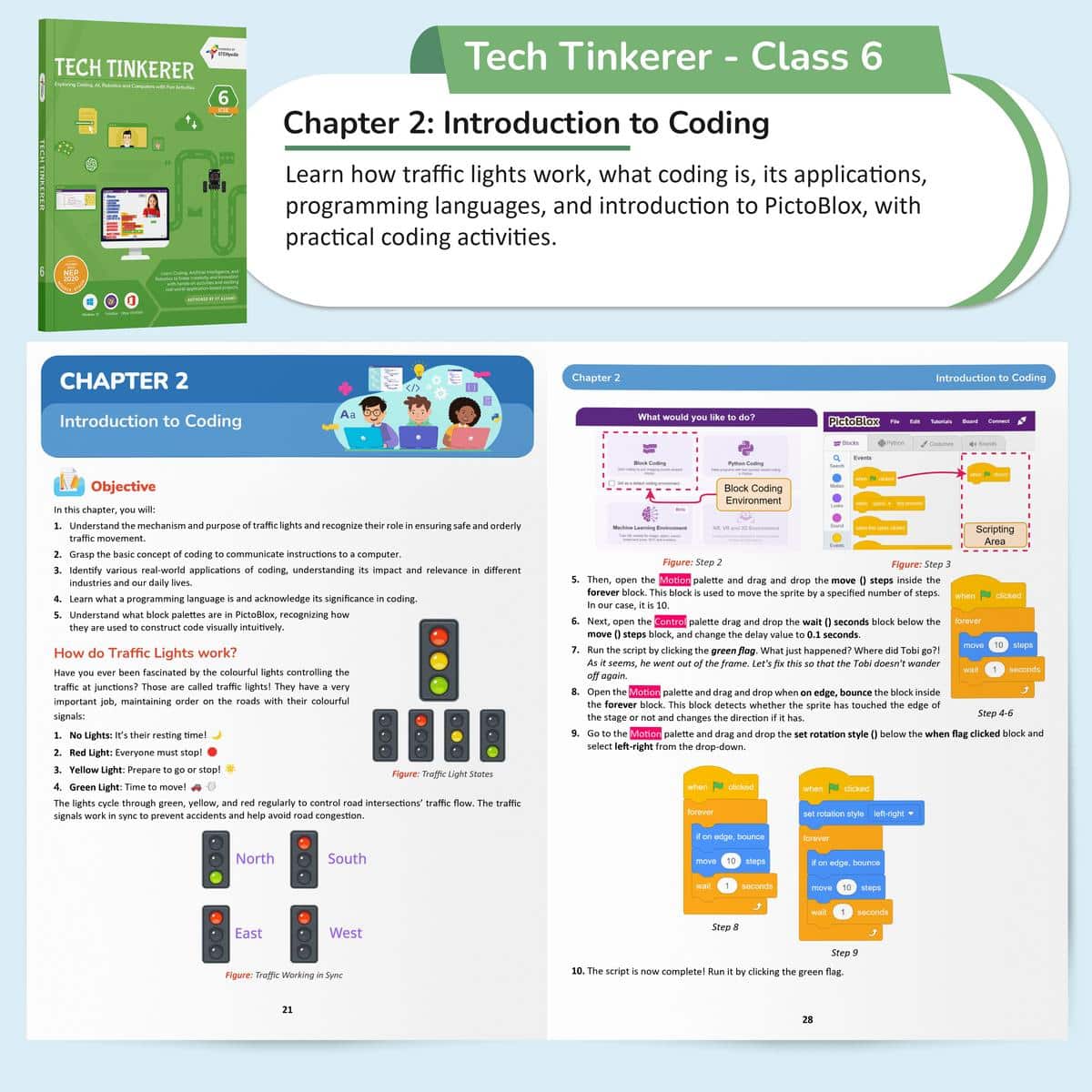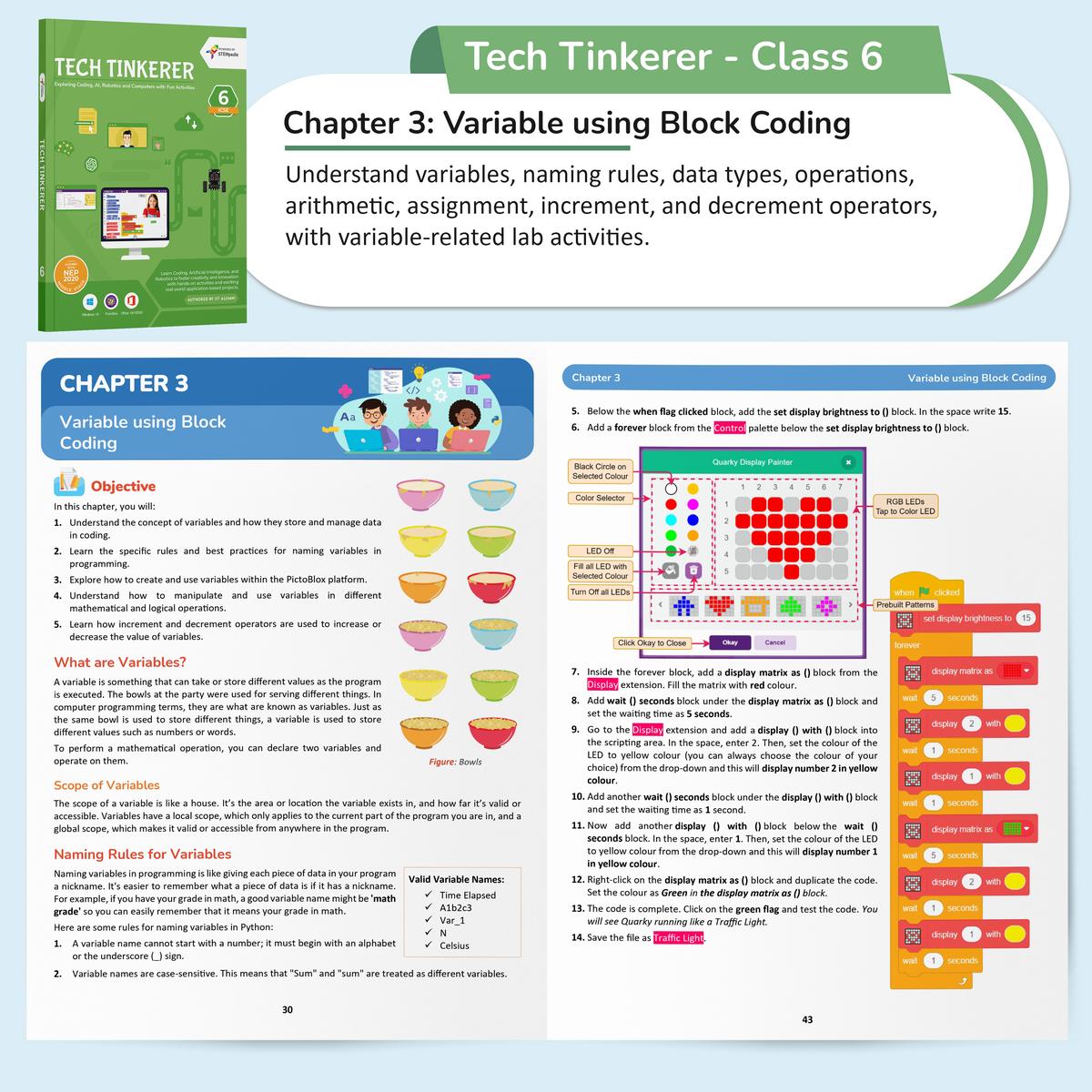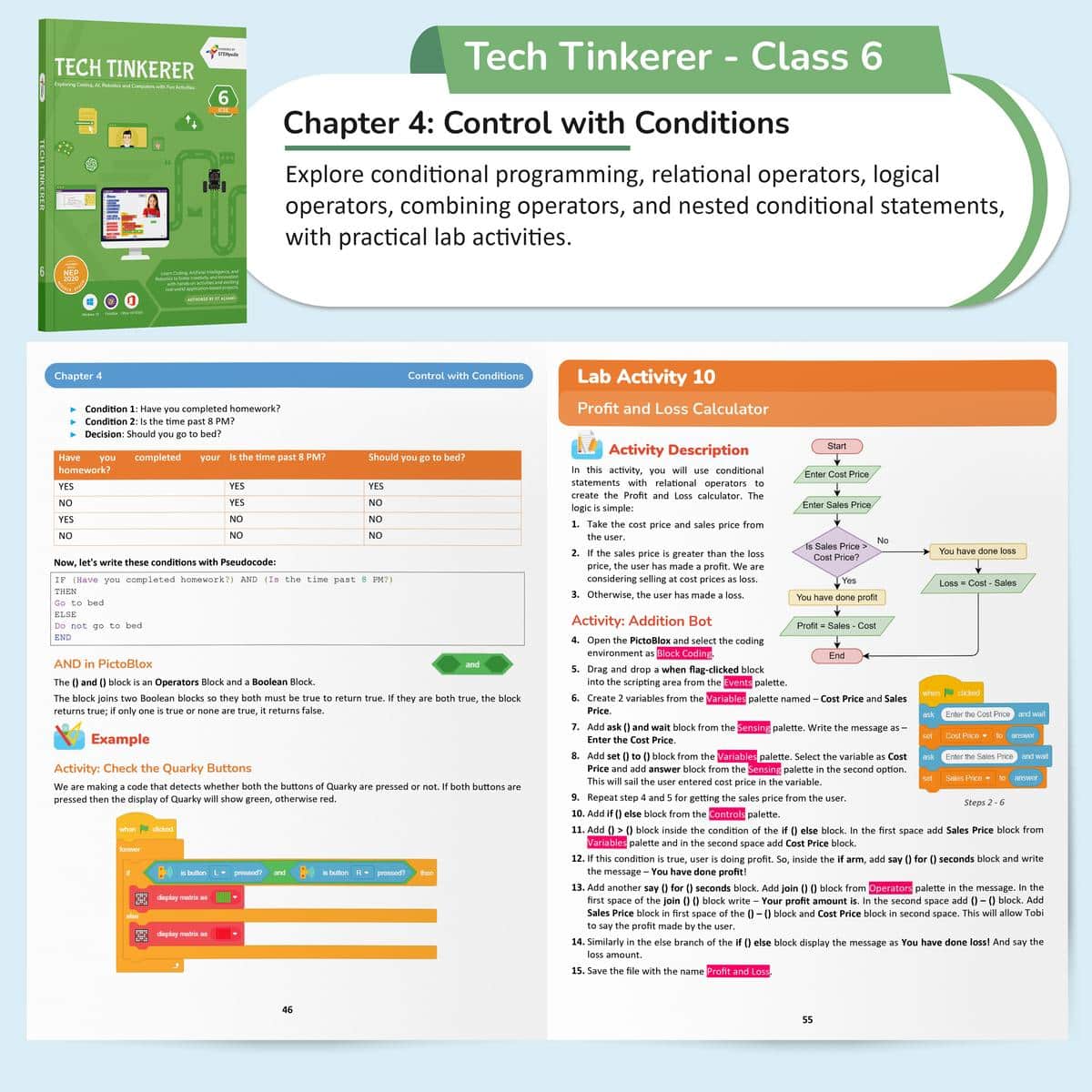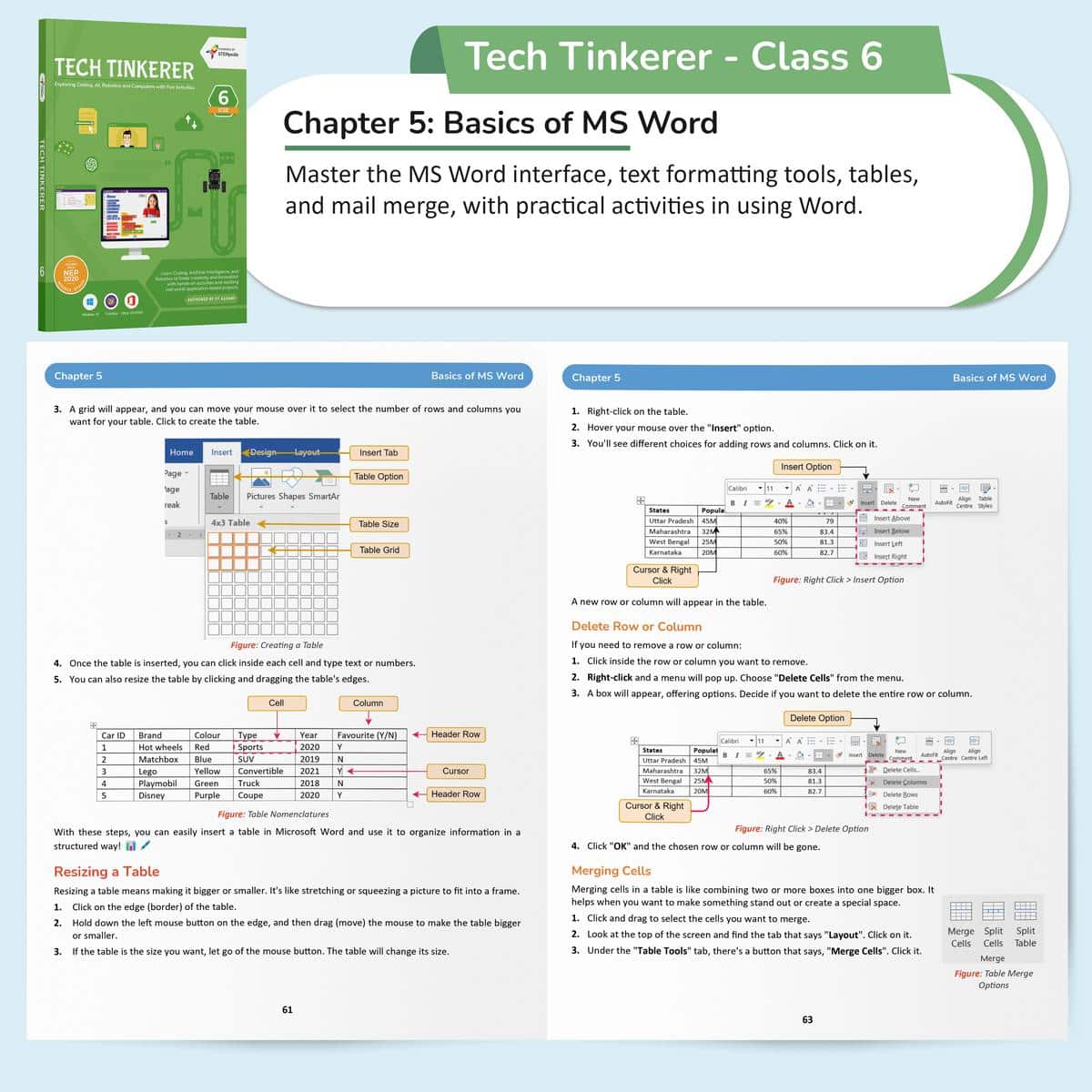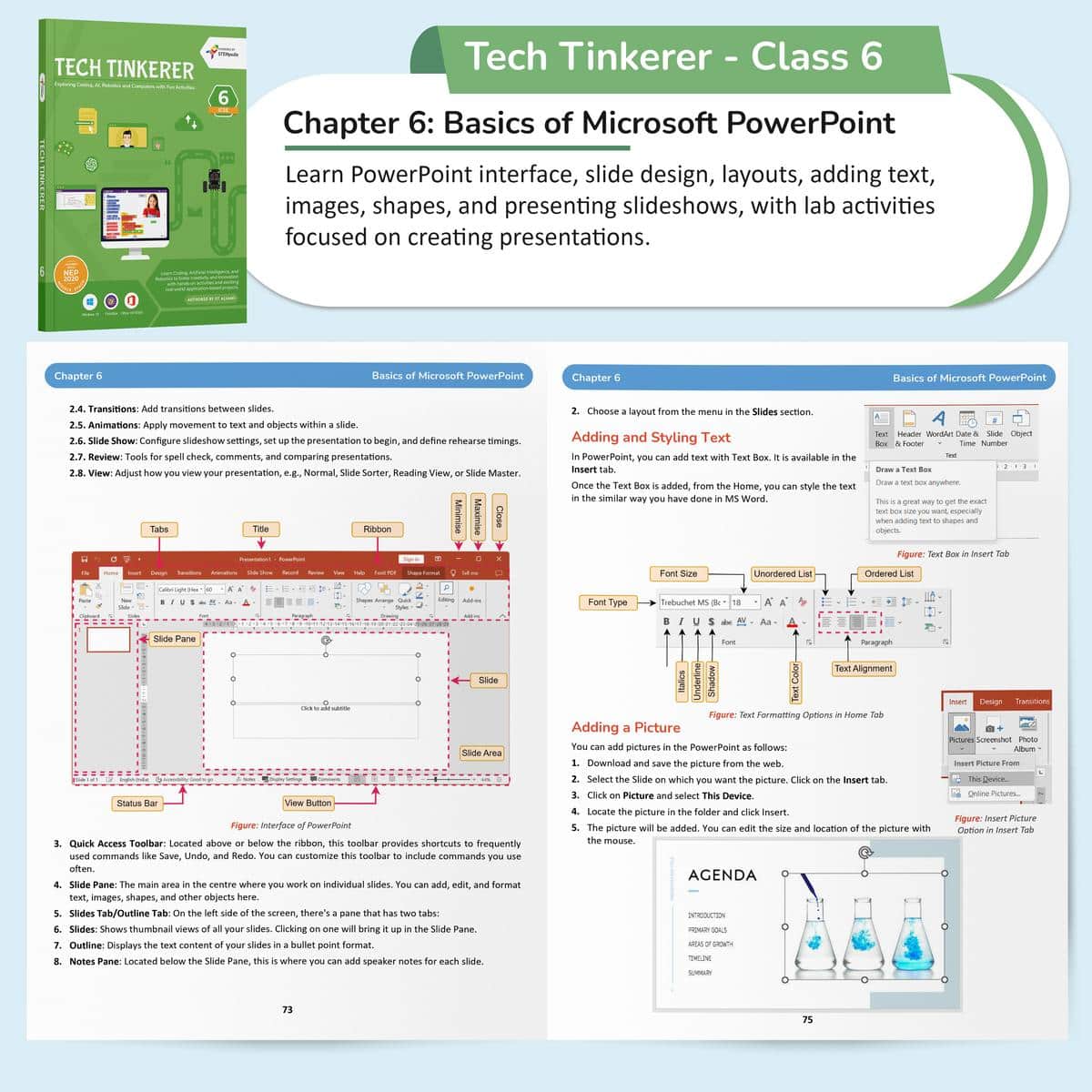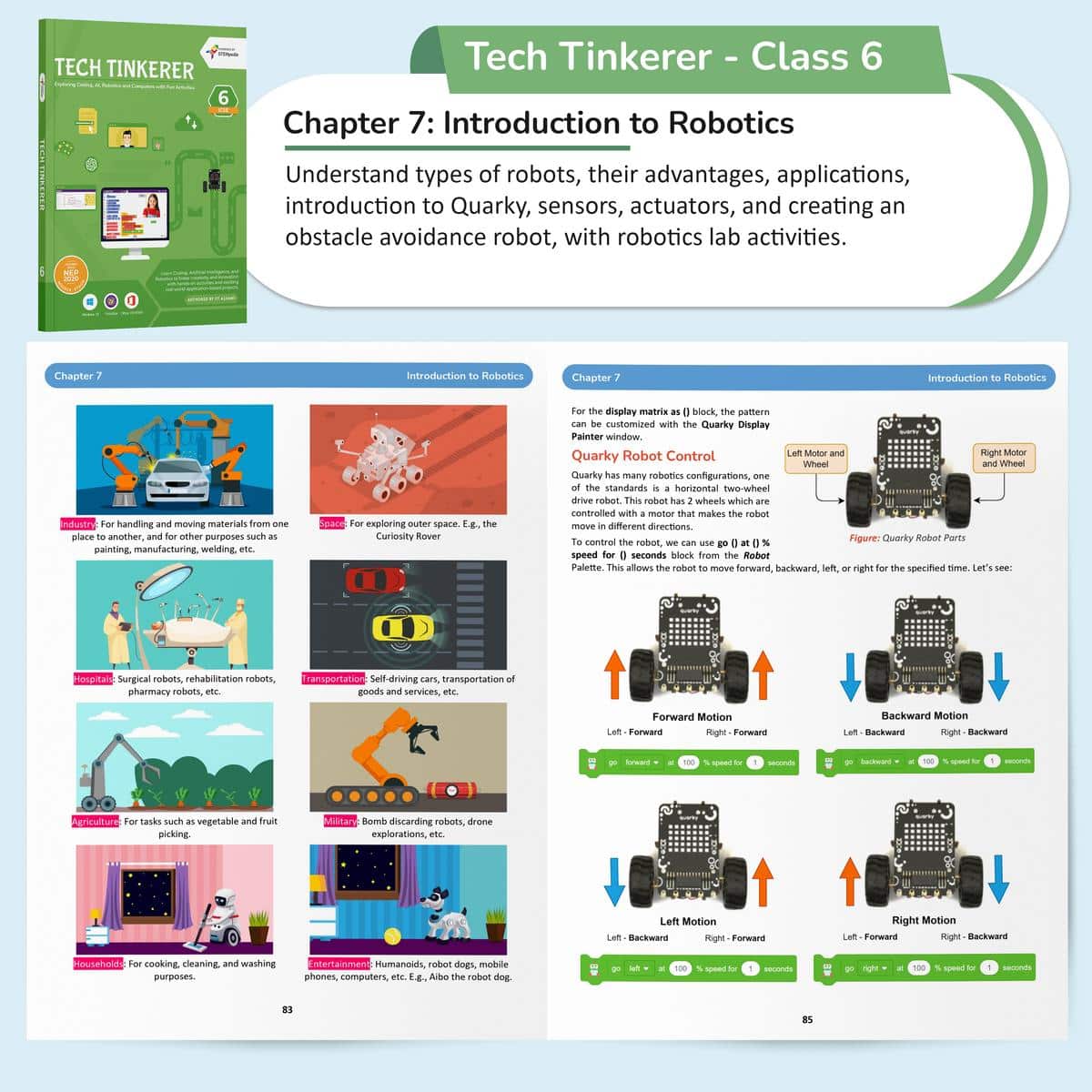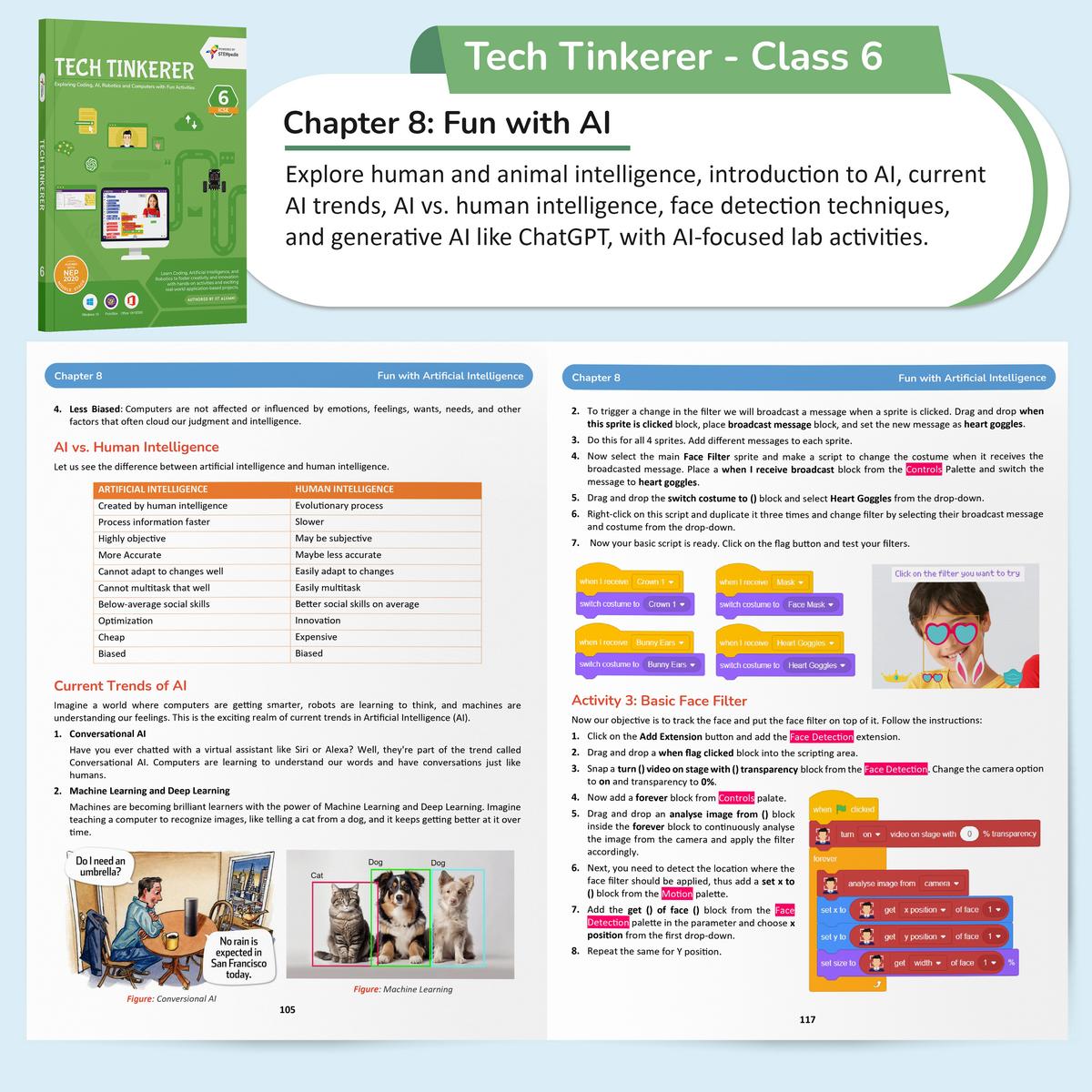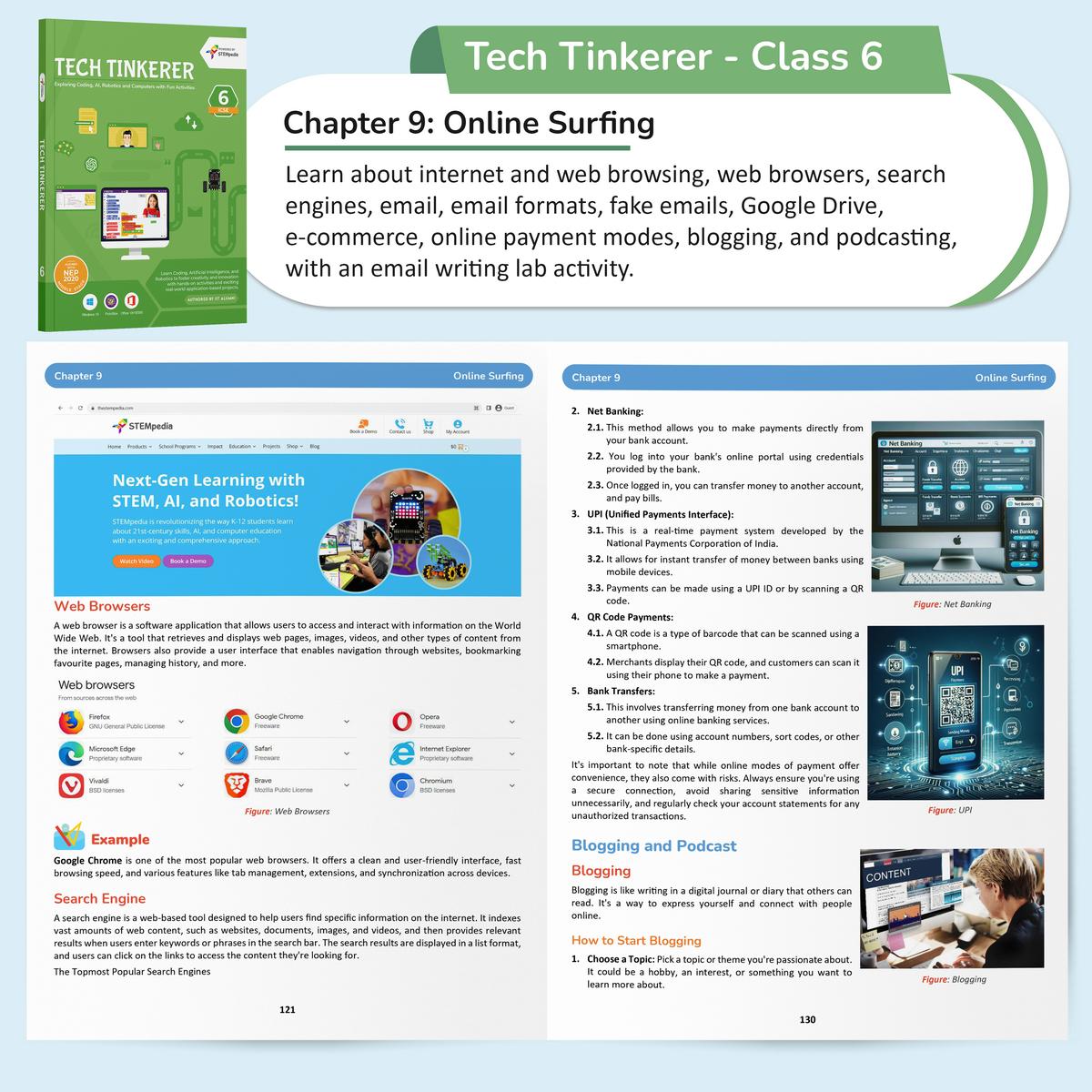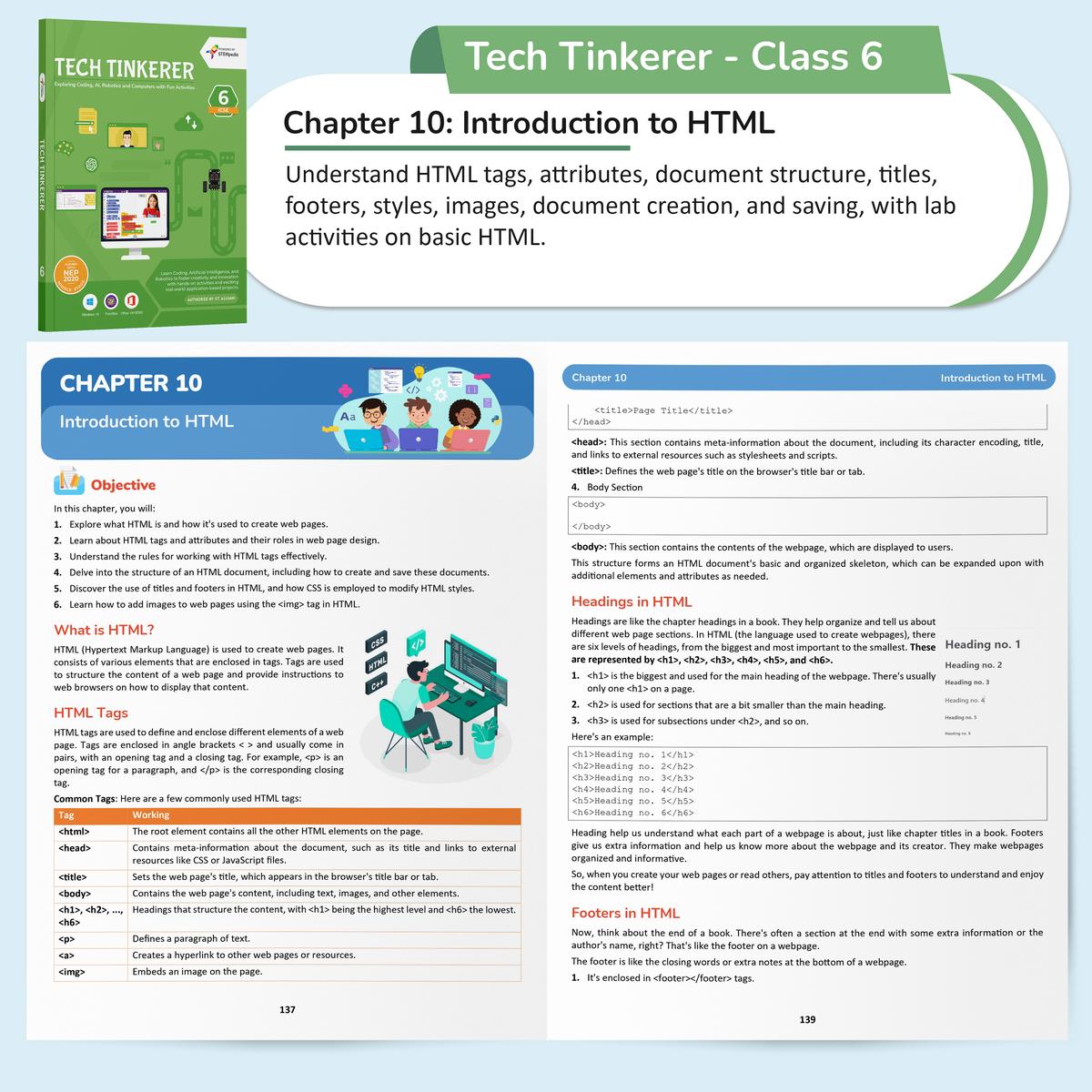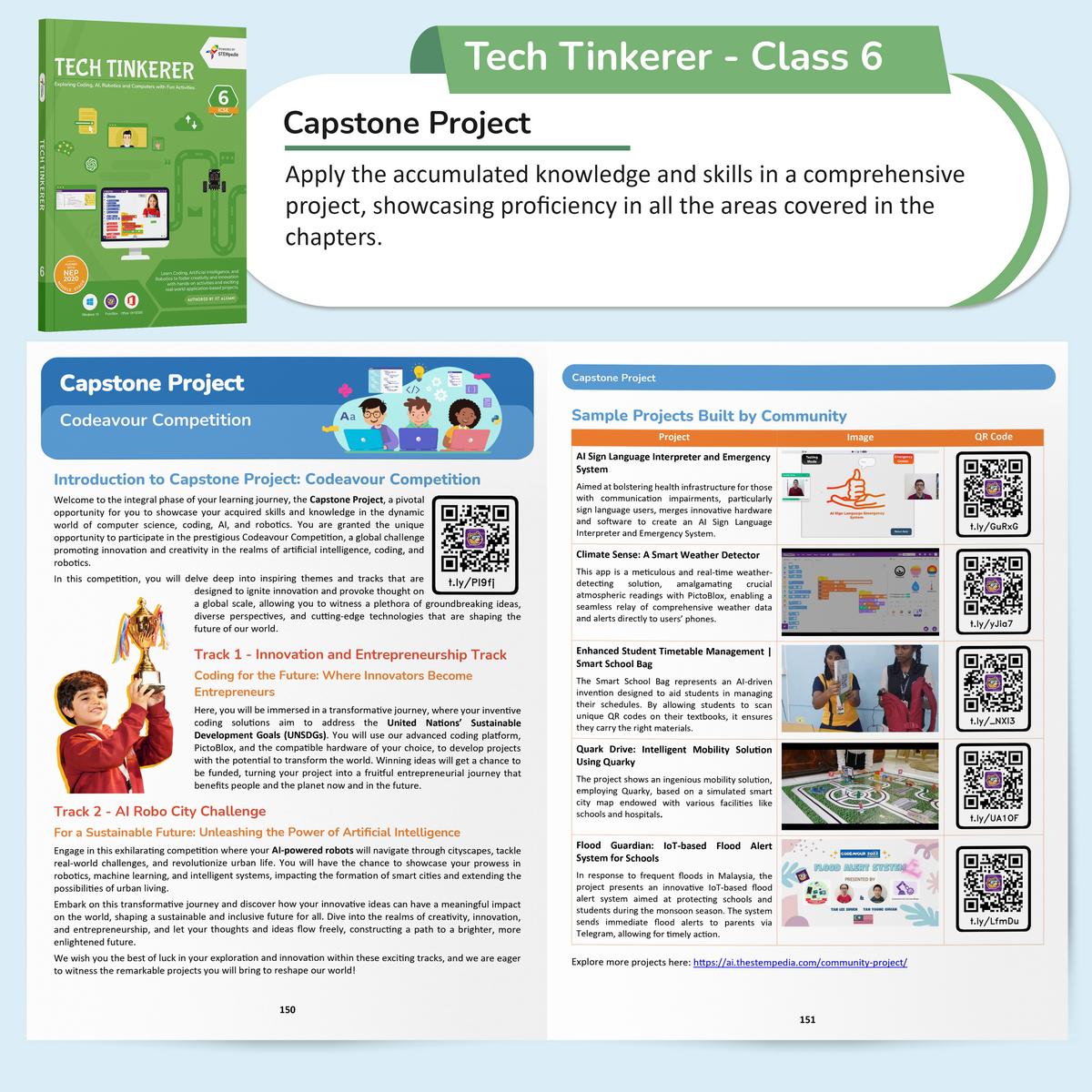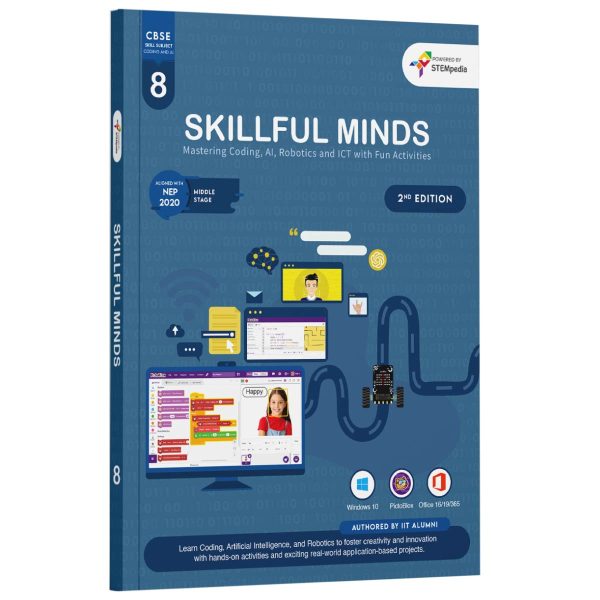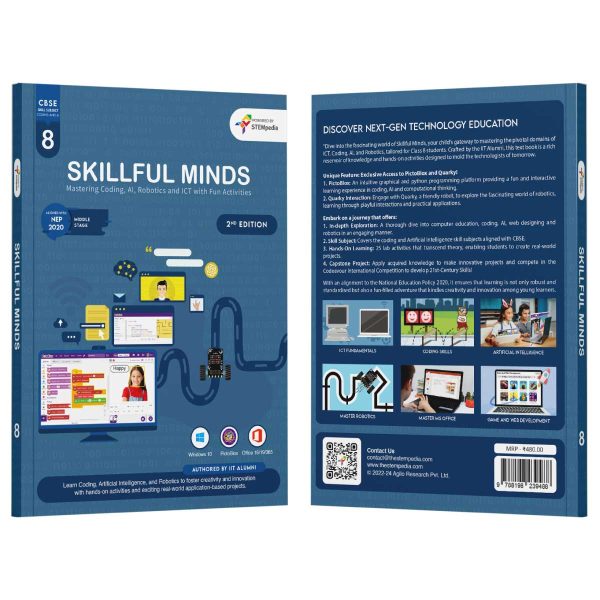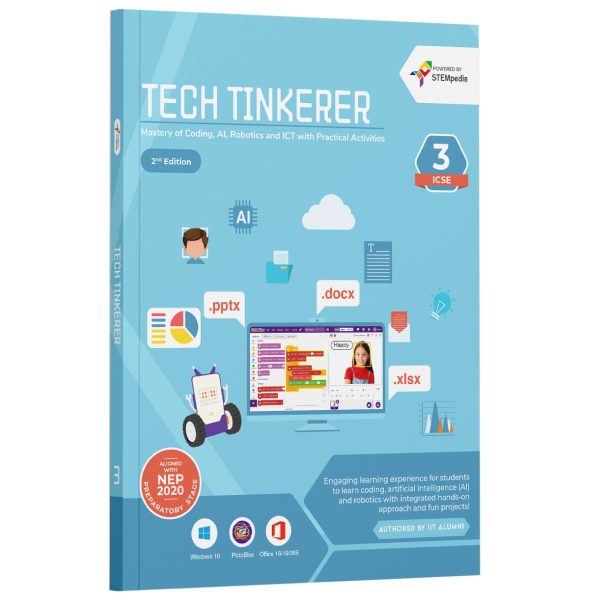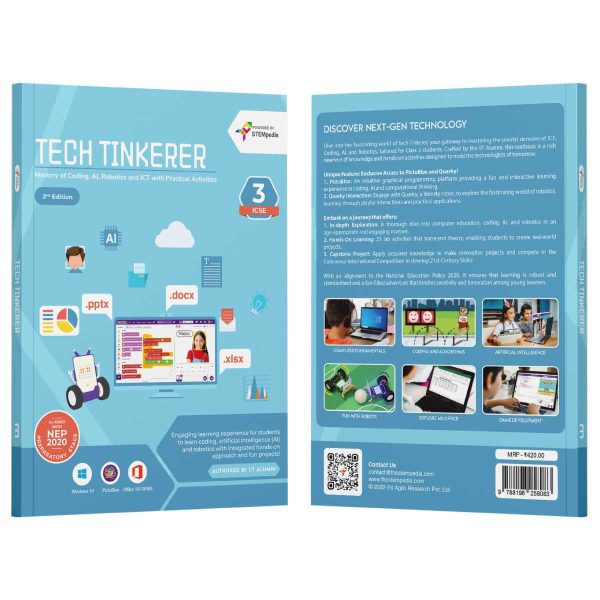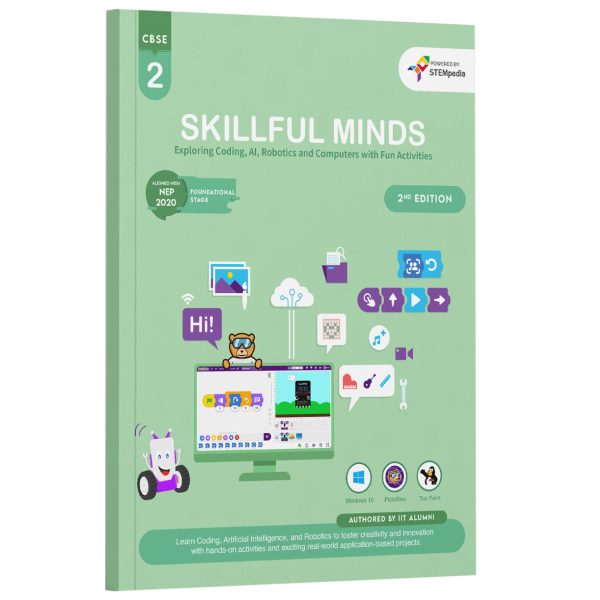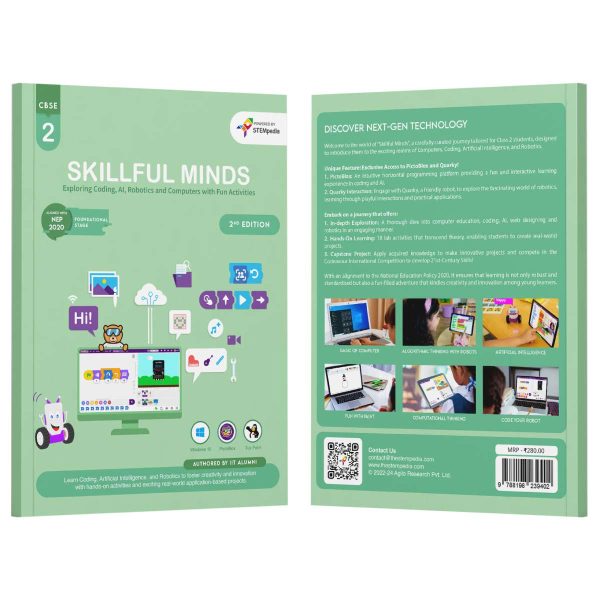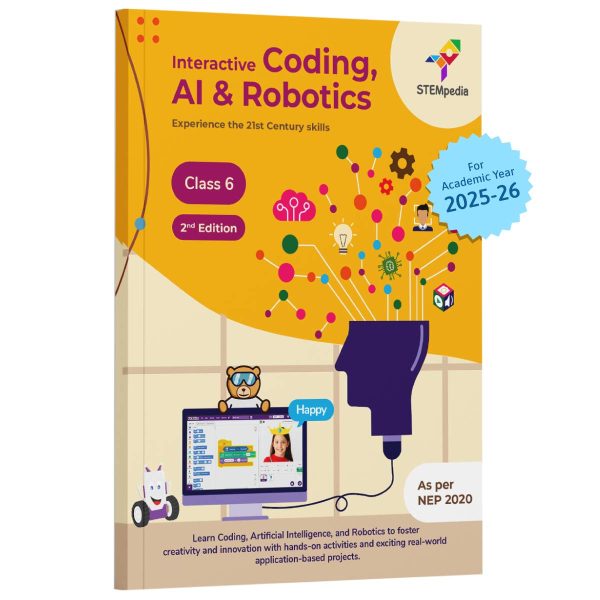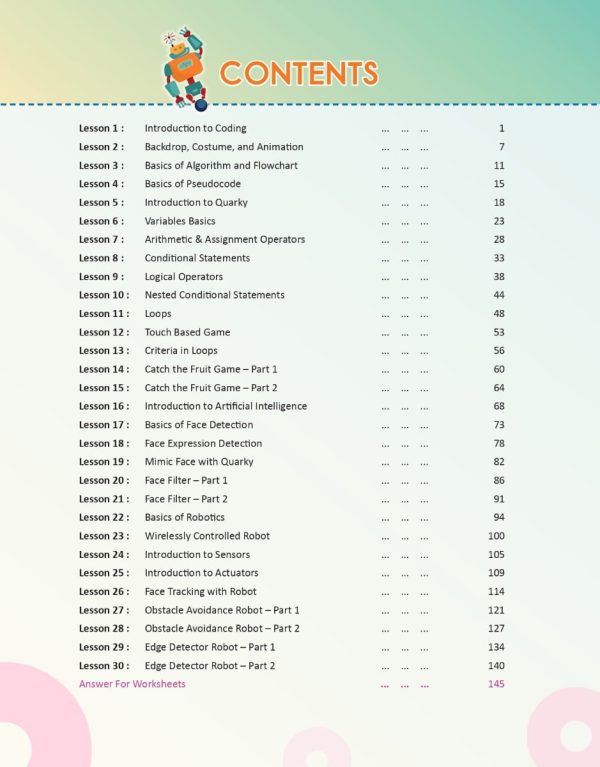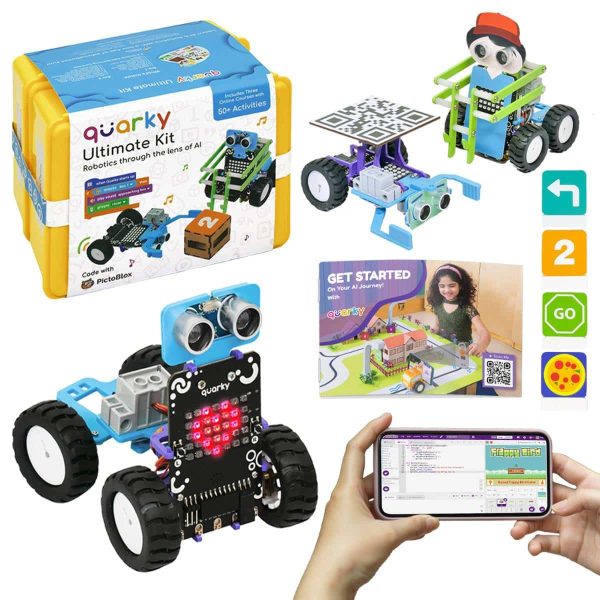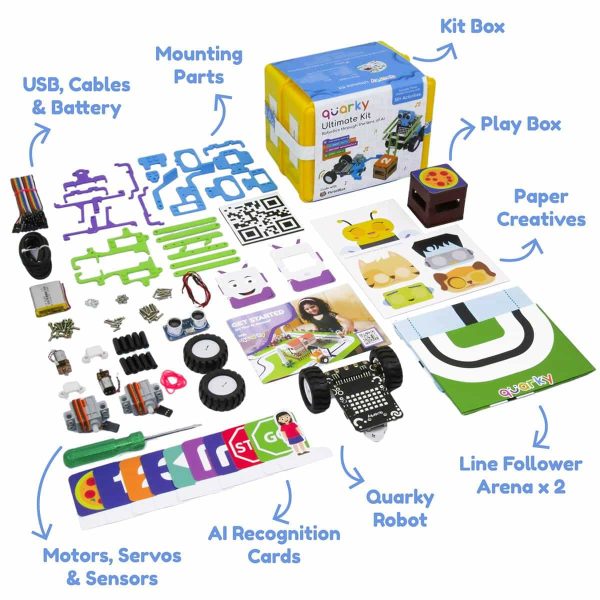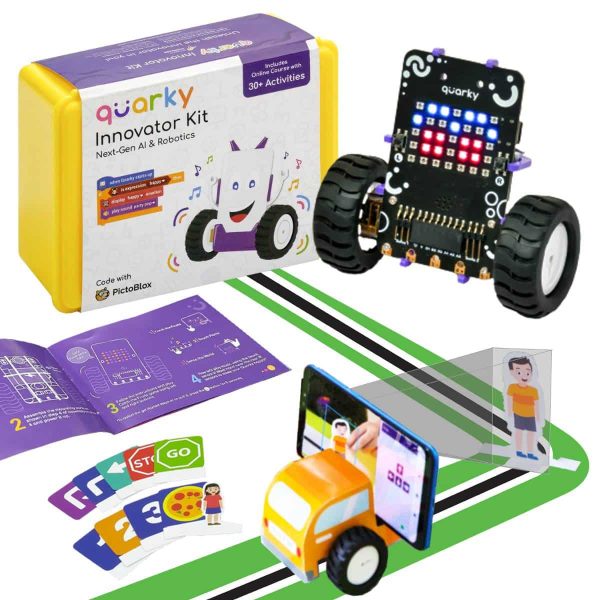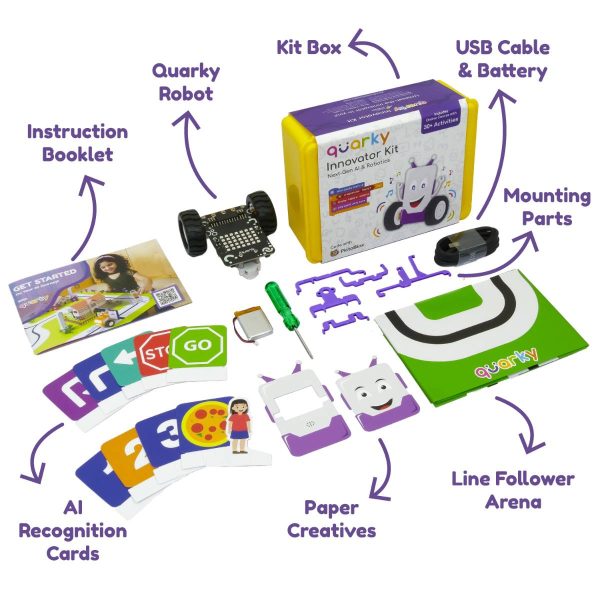Empowering Kids with the Right Future Skills
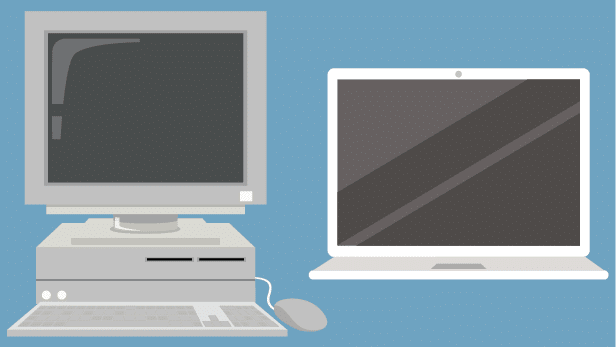
ICT Fundamentals
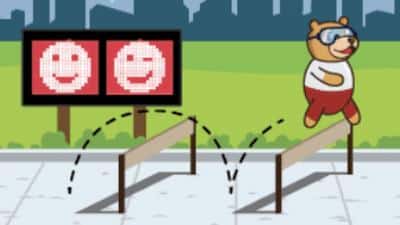
Coding Skills

Artificial Intelligence
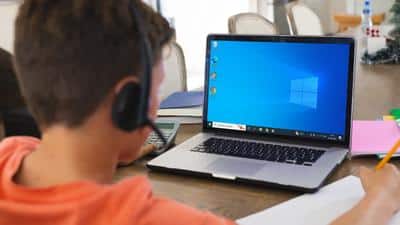
Computer Fundamentals

Coding and Algorithms

Artificial Intelligence
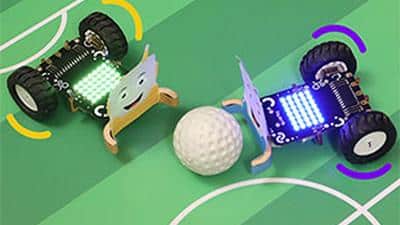
Fun with Robotics
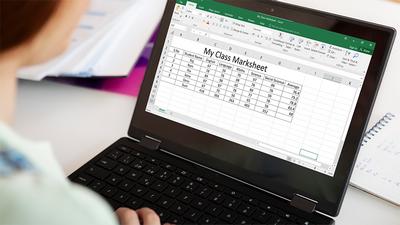
Explore MS Office
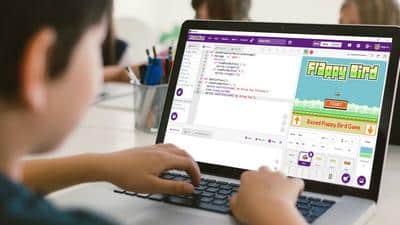
Game Development
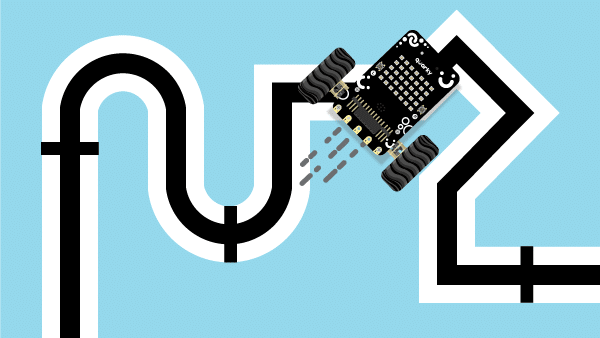
Master Robotics

Master MS Office
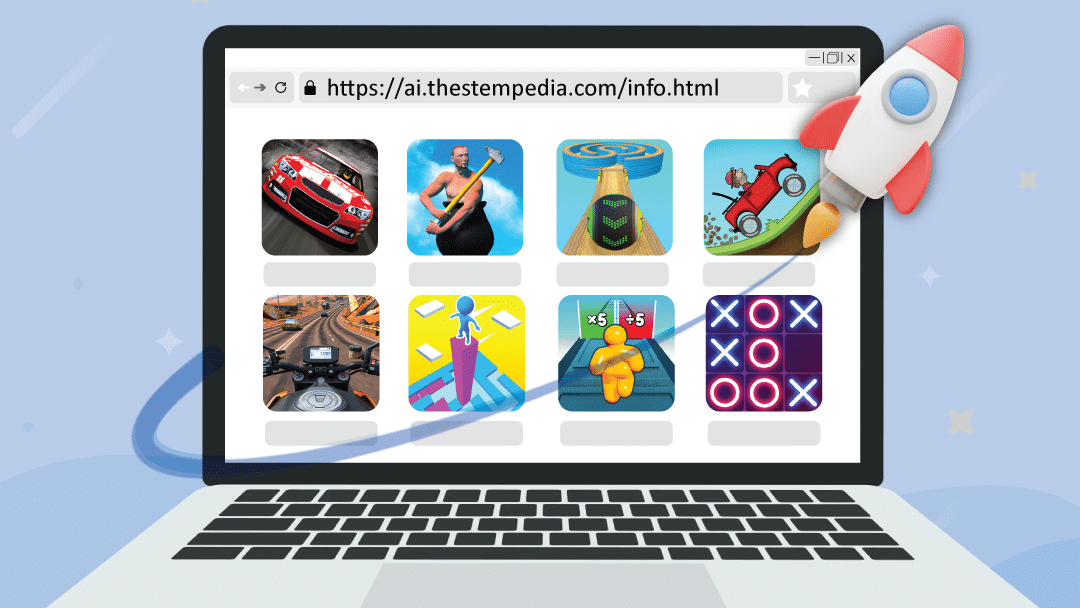
Game Development
Inside the Book
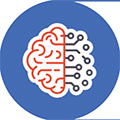
21st Century Skills
Chapters and activities designed to impart skills pertinent to the evolving technological landscape of the 21st century.
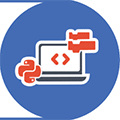
NEP Aligned Skill Subjects
Aligned with NEP, AI and Coding subject are added, assisting students in excelling in their exams and build tech competency.
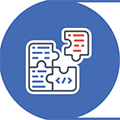
Activity-Based Learning
Incorporating 25 hands-on activities and theme-based learning that make learning both fun and intellectually stimulating.

Learn with Quarky Robot
Interactive sessions with the Quarky robot enhance engagement and maintains a high level of interest.

PictoBlox AI Software
Learn the art of coding through block coding in PictoBlox, a premier tool for young learners. Students also receive 3000 AI credits for PictoBlox.

Codeavour Competition
Exclusive access to Codeavour – the AI and Robotics Competition, with the opportunity to represent India on the global stage at Dubai.
Software and Hardware Used

Windows 10

Windows Media Player

MS Word 16/19

MS PowerPoint 16/19

PictoBlox Block Coding

PictoBlox AI
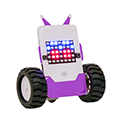
Quarky Robot
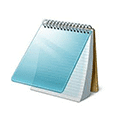
Notepad

HTML
Chapter-wise Learning Outcome
| # | Chapter Name | Learning Outcome | Activities | Tool Used |
|---|---|---|---|---|
| 1 | Basics of ICT | Developing an understanding of computer systems, computer categories, programming languages, translators, and file management in Windows. | 3 | Windows 10, File Manager, Windows Media Player |
| 2 | Introduction to Coding | Learning the basics of coding, understanding traffic lights as an example, and an introduction to PictoBlox and its interface. | 1 | PictoBlox |
| 3 | Variable using Block Coding | Mastering the use of variables in block coding, including naming rules, data types, and operations on variables. | 4 | PictoBlox |
| 4 | Control with Conditions | Developing skills in conditional programming, understanding relational and logical operators, and using nested conditional statements. | 3 | PictoBlox |
| 5 | Basics of MS Word | Gaining proficiency in MS Word, including formatting text tools, working with tables, and using mail merge. | 2 | MS Word |
| 6 | Basics of Microsoft PowerPoint | Learning to use MS PowerPoint effectively for slide design, adding text and images, and presenting slideshows. | 2 | MS PowerPoint |
| 7 | Introduction to Robotics | Understanding the basics of robotics, types of robots, their applications, and working with Quarky, sensors, and actuators. | 4 | Quarky Robot |
| 8 | Fun with AI | Exploring artificial intelligence, including current AI trends, face detection techniques, and generative AI like ChatGPT. | 3 | PictoBlox AI |
| 9 | Online Surfing | Developing skills in internet and web browsing, email usage, e-commerce, and understanding online modes of payment. | 1 | Chrome |
| 10 | Introduction to HTML | Learning the basics of HTML, including tags, attributes, document structure, and creating a simple web page. | 2 | Notepad, HTML |
Lab Activities in the Book
The book includes a range of lab activities in each chapter, designed to reinforce theoretical concepts through practical, hands-on experience.
| Lab Activity | Name | Learning Outcome |
|---|---|---|
| Lab Activity 1 | Practice Search & File Management in Windows 10 | Developing proficiency in file management and search techniques in Windows 10. |
| Lab Activity 2 | Practice Data Transfer in Windows 10 | Learning to organize and manage data effectively through folder creation and file transfer. |
| Lab Activity 3 | Practice File Compression in Windows | Gaining skills in file compression and understanding its utility in data management. |
| Lab Activity 4 | Tobi Walking Animation | Creating a digital animation of Tobi walking using PictoBlox, developing animation and coding skills. |
| Lab Activity 5 | Tracking Sprite using Variables | Mastering variable usage in PictoBlox to track and display sprite movements. |
| Lab Activity 6 | Addition Bot | Developing a script in PictoBlox for addition operations, enhancing programming and arithmetic skills. |
| Lab Activity 7 | Playing with Quarky | Exploring Quarky's capabilities in displaying emotions and responding to key controls. |
| Lab Activity 8 | Traffic Light with Quarky | Learning to program a custom traffic light pattern on Quarky's LED matrix. |
| Lab Activity 9 | Practicing Conditional Programming | Enhancing skills in conditional programming and logical operations using Quarky. |
| Lab Activity 10 | Profit and Loss Calculator | Developing a profit and loss calculator using conditional statements and relational operators. |
| Lab Activity 11 | Nested Conditional Statements | Gaining proficiency in nested conditional statements for complex logical operations. |
| Lab Activity 12 | Practice MS Word - Working with Tables | Creating a professional resume in MS Word, focusing on table creation and document formatting. |
| Lab Activity 13 | Practice Mail Merge with MS Word | Learning to use Mail Merge in MS Word for creating personalized invitation letters. |
| Lab Activity 14 & 15 | Practice MS PowerPoint - Present Yourself | Enhancing presentation skills by creating a self-presentation in Microsoft PowerPoint. |
| Lab Activity 16 | Discovering Robot Controls | Gaining hands-on experience in controlling a robot's movement in different directions. |
| Lab Activity 17 | Wirelessly Controlled Robot | Mastering wireless control of a robot using key inputs for movement. |
| Lab Activity 18 | Controlling Servo Motor | Assembling and controlling an obstacle avoidance robot, including servo motor manipulation. |
| Lab Activity 19 | Obstacle Avoidance Robot | Learning to code a robot for obstacle detection and avoidance. |
| Lab Activity 20 | Face Detection with PictoBlox | Developing a script for face detection using PictoBlox, understanding basic AI concepts. |
| Lab Activity 21 | Creating a Face Filter App | Building a face filter application using PictoBlox, combining AI with user interaction. |
| Lab Activity 22 | Transform Word in Colourful Emojis | Creating a chatbot in PictoBlox that converts text to emojis, integrating ChatGPT. |
| Lab Activity 23 | Writing an Email to a Friend | Composing and sending a birthday invitation email, enhancing digital communication skills. |
| Lab Activity 24 & 25 | HTML Basics - A Space Exploration Journey | Applying HTML knowledge to create a visually appealing webpage on space exploration. |
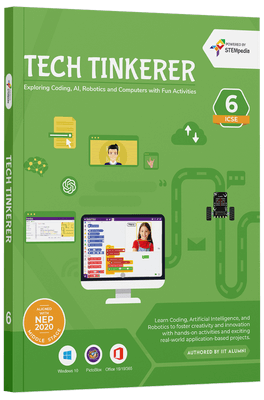
Get Your Book Today!
Tech Tinkerer is the book your child needs to start their journey in technology. Equip them with the skills of tomorrow, today!
FAQs on Tech Tinkerer - Class 6 Book
This Tech Tinkerer book is designed to introduce Class 6 students to the fundamentals of ICT, coding, artificial intelligence, and robotics. It focuses on both conceptual and practical learning, empowering students to comprehend and construct technology. The book encourages critical thinking, problem-solving, and creativity in line with the National Education Policy 2020.
Yes, the book includes 25 lab activities covering various aspects of ICT, coding, AI, and robotics. These activities are clearly articulated, offering step-by-step guidance to ensure practical, hands-on learning.
‘Tech Tinkerer’ aligns well with the ICSE curriculum, particularly in the following areas:
- Categories of Computers and Computer Languages:
- The book covers the basic features of different categories of computers, such as microcomputers, mini-computers, mainframes, supercomputers, mobile devices, game consoles, and embedded computers.
- It delves into various computer languages, explaining low-level languages (like machine and assembly languages) and high-level languages (such as C, C++, Java).
- The evolution of computer languages and the role of translators (interpreters and compilers) are discussed, helping students understand how languages have developed and how they interact with computer hardware.
- File Management – Organization of Data:
- ‘Tech Tinkerer’ includes practical exercises and theoretical knowledge that help students understand file management. This includes transferring data between devices, working with multiple applications, searching for files using wildcard characters, and understanding various file formats (JPEG, MP3, MP4, doc, XLS).
- Hands-on activities are provided to reinforce these concepts, ensuring students can move/copy data, use applications simultaneously, and understand file formats’ significance.
- Word Processor – Tabular Presentation and Mail Merge:
- The book guides students through creating and formatting tables in a word processor, aligning with the curriculum’s focus on tabular presentation.
- It also covers mail merge, an important feature of word processors, teaching students to create personalized documents in bulk, which is a key learning outcome of the ICSE curriculum.
- Presentation – Visual Effects:
- ‘Tech Tinkerer’ includes chapters on creating effective presentations using software like Microsoft PowerPoint, aligning with the curriculum’s emphasis on enhancing presentations with visual effects, animations, transitions, and media clips.
- Scratch Programming – Introduction to Game Creation:
- The book introduces block coding with tools like PictoBlox, which aligns with the curriculum’s focus on creating games and understanding commands of different programming blocks.
- HTML – An Introduction:
- There are chapters dedicated to HTML, helping students define, create, and design web pages, in line with the curriculum’s focus on understanding and using HTML tags and features.
- Internet – Online Surfing:
- The book covers internet services such as email, e-commerce, blogging, podcasting, and Google Drive, in line with the curriculum’s focus on using the Internet effectively and safely.
In summary, ‘Tech Tinkerer’ is a comprehensive resource that aligns with the ICSE curriculum by covering key concepts, providing hands-on activities, and ensuring that students achieve the learning outcomes outlined in the curriculum.
The Capstone Project in the book is tailored to help students apply their skills in the Codeavour Competition, a global contest in AI, coding, and robotics. This competition encourages innovation and allows students to explore different themes and tracks.
Yes, there is a chapter dedicated to Artificial Intelligence, discussing its trends, comparison with human intelligence, and applications like face detection and generative AI, including a mention of ChatGPT.
Yes, The book is structured to be accessible not just to students but also to educators and parents who may be guiding the learning process. The detailed explanations of concepts and step-by-step guidance in lab activities make it easier for adults to support students in their learning journey. Additionally, the authors encourage feedback and suggestions, indicating a willingness to provide further assistance and resources as needed.
Real-world application is a key focus of Tech Tinkerer. The lab activities are designed to mimic real-life scenarios, helping students understand how the concepts they learn can be applied outside the classroom. For instance, projects involving AI and robotics give students insights into how these technologies are used in various industries. The inclusion of the Codeavour Competition as part of the Capstone Project further encourages students to think creatively and apply their skills in a competitive and practical context.
The book employs a variety of methods to keep students engaged. This includes interactive lab activities, puzzles, and exercises that challenge students to think critically and apply their knowledge. The higher-order thinking questions stimulate in-depth understanding and exploration of the topics. Additionally, the book’s layout and presentation are designed to be visually appealing and student-friendly, making the learning process more enjoyable and less daunting.
Quarky is a robotic tool used in various lab activities within the book. It is designed to provide hands-on experience in robotics, helping students understand basic robotic functions and control mechanisms. Through activities involving Quarky, students learn about robotics in an interactive and engaging manner.
PictoBlox is a graphical programming software introduced in the book. It’s used in several lab activities to teach coding and programming concepts. PictoBlox’s user-friendly interface makes it an effective tool for introducing students to programming, allowing them to create animations, games, and more.

